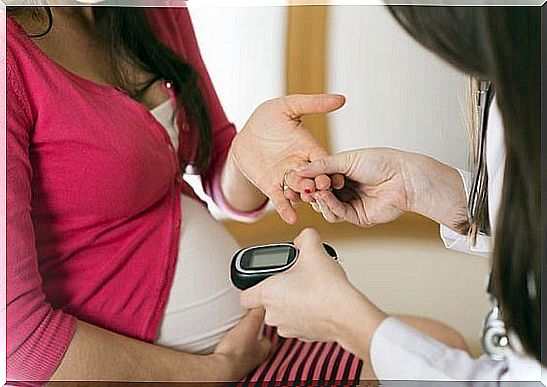Diet To Prevent Gestational Diabetes

Approximately 3-5% of pregnant women develop gestational diabetes in the second or third trimester. It is produced by a dysfunction of the beta cells of the pancreas aggravated by insulin resistance and the hormonal alteration characteristic of this stage of life. Although there are multiple risk factors, it is key that you know what diet is like to prevent gestational diabetes.
It is diagnosed by the O’Sullivan test, which consists of assessing blood sugar levels after ingesting 50 g of oral glucose. In the event that it was greater than 139 mg / dl, a posterior curve is made with 100 g during a period of 3 hours.
Do you know that having it and not treating it properly means the appearance of complications for both you and your future child? On the one hand, you have a higher risk of pre-eclampsia, premature and cesarean delivery, as well as the development of type 2 diabetes. On the other hand, the child is born with a weight greater than 4 kg (better known as macrosomia), hypoglycemia and long-term obesity, type 2 diabetes, and other metabolic diseases.

Gestational diabetes risk factors
As mentioned at the beginning, the risk of gestational diabetes increases by
- Overweight or obese. It is related to the weight before pregnancy and the gain during this stage.
- Family history of gestational diabetes.
- Previous diagnosis of gestational diabetes.
- Pregnancy from 35 years of age.
- Race and ethnicity. It is increasing in Asian and Hispanic countries, in the Pacific islands and in North Africa.
- Lack of physical activity.
- Polycystic ovary syndrome.
In addition, diet is another risk factor to take into account, as you will see below, since it is effective in 80% of cases.
Diet to prevent gestational diabetes
The main goal of diet during gestational diabetes is to regulate blood glucose levels. Most of the studies carried out agree that adherence to the Mediterranean diet based on the consumption of vegetables, legumes, fruits, whole grains, virgin olive oil and fish prevents the appearance of gestational diabetes.
Complex carbohydrates are generally advised to account for 40% of daily calories. Therefore, it is not recommended to drink soft drinks and juices, as well as products rich in fast absorbing sugars, such as sweets and pastries (including cookies).
It is also recommended to reduce the intake of sausage and foods rich in trans fats, since they increase the risk of developing it by 6%. Differences have even been observed between the consumption of proteins of animal origin (meat, fish and eggs) and vegetable (legumes). After substituting 5% of the meat for legumes, the risk is reduced by 51%.
Vitamin D is one of the nutrients very present in research, since the deficit is very common and has been related to an increase in the appearance of this type of diabetes. However, supplementation shows conflicting results.
As for hydration, you can drink water both before, during and after meals, or some infusion. Regarding coffee and tea, it is preferable that they are without caffeine or theine. In case it was not enough to lower blood glucose, insulin injections are prescribed.

Example of diet to prevent gestational diabetes
- Breakfast : 1 glass of milk or vegetable drink + 1 slice of whole wheat bread with canned tuna and roasted peppers or peanut butter and banana slices.
- Mid-morning (if you’re hungry): 1 natural yogurt with oat flakes and diced apple.
- Lunch : chicory, tomato and corn salad + baked gilthead with potato, leek and carrot + 1 slice of watermelon.
- Snack (optional): rooibos tea + a handful of toasted almonds.
- Dinner : gazpacho + scrambled egg or tofu with mushrooms + 1 piece of medium fruit (peach, for example).
About Diet to Prevent Gestational Diabetes
Finally, given that gestational diabetes generates complications throughout pregnancy and after delivery, all pregnant women are subjected to the diagnostic test from week 24. This way, it is easier to control.
Likewise, it is important that you go to a dietitian-nutritionist for advice on how to eat to prevent gestational diabetes and treat it so that your child grows up healthy.










